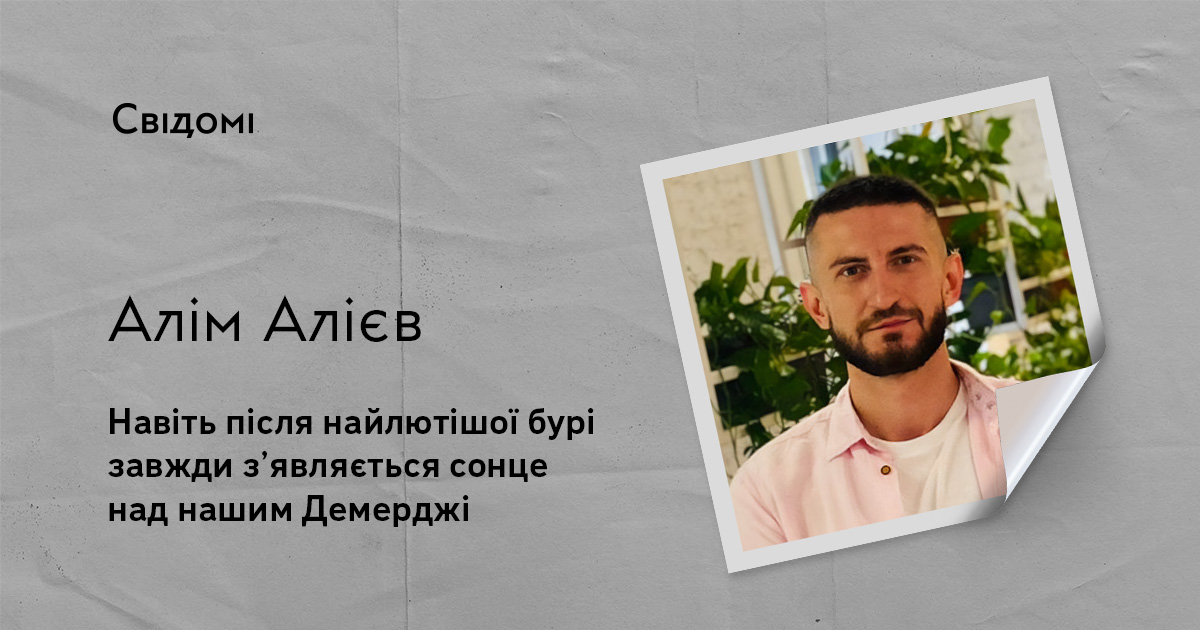Even after the fiercest storm, the sun always appears over our Demerdzhi
Alim Aliev

The Crimean Tatar journalist, human rights activist, deputy director general of the Ukrainian Institute and co-founder of the public organization Crimea_SOS Alim Aliev tells about the events in Crimea after the announcement of a partial mobilization of the Russian Federation and explains why it is another genocide against the Crimean Tatars.
On September 21, Putin announced a partial mobilization to attract a new force, which the Russian authorities plan to throw at the war against Ukraine, because today their resources are exhausted, and the Russian Federation has high losses on the battlefield. According to the official data announced by Shoigu, they plan to summon 300 thousand people; the media, including sources in the Russian authorities, say that they should summon 1 million 200 thousand Russians.
It was the echoes of this mobilization on the first day after Putin's speech that reflected on Crimea and the Crimean Tatars. On the same day, employees of military commissariats, law enforcement agencies, local administrations began to issue summonses to Crimean Tatars, the indigenous people of Ukraine, who have been resisting massively and expressing their pro-Ukrainian position for eight years It is therefore an attempt at revenge by the Russian occupation authorities against the Crimean Tatars.
What are they doing?
There are massive settlements of Crimean Tatars on the peninsula, and these mass settlements arose after returning to their homeland after the 1980s and early 1990s. Today, these settlements are actually taken in a ring, they come in and distribute summonses, call from recruitment offices and order to pick up the summonses. Summonses are distributed at the enterprises where Crimean Tatars work, at the markets and even in schools.
This is a new targeted type of repression. This is a war crime under international humanitarian law and Article 51 of the Geneva Convention, which states that occupiers in the invaded territories have no right to conscript civilians into the armed forces. But this is what is happening now.
This is a situation that can lead to the genocide of the indigenous people, to the genocide of the Crimean Tatars.
Why?
Because, firstly, they are trying to throw the Crimean Tatars into the war as meat against their own country. Secondly, Crimean Tatars are now proportionally well represented in the Armed Forces of Ukraine. This means that Russia is trying to make Crimean Tatars turn on each other. Fight each other.
This leads to the physical destruction of the male population, to the destruction of the gene pool. Realizing this and having an overwhelmingly pro-Ukrainian position, Crimean Tatars have now adopted several tactics: one of them is to avoid receiving summonses at all costs, not to attend events, to try to refuse to serve in the army, referring to their pacifist or religious beliefs, which in practice does not work much. There is also the fact that people are actively leaving Crimea, hiding. Mass exodus of Crimean Tatar people from the peninsula is happening again
In other words, it is another attempt of Russia to colonize the peninsula. By colonization we mean militarization - Crimea has become a launching pad from where Russia launches its missiles to other territories of Ukraine.
This is the militarization of the consciousness of people who are set against their fellow countrymen.
It is also about the destruction of democratic institutions, media, civil society, and the institutions of the indigenous people — the Majlis, which is considered an extremist organization and is banned in Russia. Some of the leaders, like my friend Nariman Dzhelyal, first deputy head of the Crimean Tatar Majlis, are receiving sentences: Nariman was sentenced to 17 years in prison. When we talk about colonization, we are also talking about the destruction of identity, tangible and intangible cultural heritage, language, history, the prohibition of religious events or events that are of symbolic importance for the Crimean Tatars.
Another key story that is connected with Crimea today is the replacement of the population, the outflow of people, the washing out of the indigenous people from the peninsula. Instead, during the eight years of the Russian-Ukrainian war, half a million to one million people from the Russian Federation moved to Crimea. For the first time this happened during the occupation of Crimea by Yekaterina II, followed by Stalin's deportation, when all the nation was deported. Today, we are witnessing the same story.
For years and centuries we have fought against imperial Russia for our memory, land, culture, language, dignity and freedom. Today we fight for the right to live in a democratic society, to build our future and develop as a people in our homeland. Therefore, Crimean Tatars in Crimea, on the territory of mainland Ukraine and in other countries of the world unite as much as possible to help each other in trouble.
I always say that even after the fiercest storm the sun always rises over our Demerdzhi. And so be it this time.


